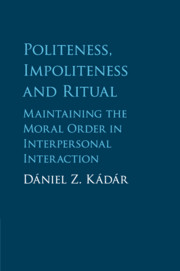Book contents
- Frontmatter
- Contents
- List of Figures
- List of Tables
- Acknowledgements
- Preface
- 1 Introduction
- Part I Ritual and (Im)Politeness: The Basic Relationship
- Part II Ritual, (Im)Politeness, and Moral Aggression
- 5 Rites of Moral Aggression
- 6 Ritual, Aggression, and Voicing the Moral Order(s)
- 7 Ritual, Responsibility, and the Moral Order(s)
- 8 Conclusion
- Notes
- References
- Index
8 - Conclusion
from Part II - Ritual, (Im)Politeness, and Moral Aggression
Published online by Cambridge University Press: 13 April 2017
- Frontmatter
- Contents
- List of Figures
- List of Tables
- Acknowledgements
- Preface
- 1 Introduction
- Part I Ritual and (Im)Politeness: The Basic Relationship
- Part II Ritual, (Im)Politeness, and Moral Aggression
- 5 Rites of Moral Aggression
- 6 Ritual, Aggression, and Voicing the Moral Order(s)
- 7 Ritual, Responsibility, and the Moral Order(s)
- 8 Conclusion
- Notes
- References
- Index
Summary
Overview
This book has attempted to model the relationship that exists between (im)politeness and ritual. As I have argued in Chapter 1, in people's daily lives, many restorative and transgressive ritual events – even though they may not be understood as ‘rituals’ in the popular sense of this word – stand out of the ordinary flow of events and interactions from a participant emic point of view (and, potentially, from an etic perspective as well). ‘Ordinary’ should be understood in this context as ‘non-salient’, which contrasts with the liminal interactional event of ritual: rituals are very much ‘ordinary’ in the sense that they reflect the moral orders that underlie interpersonal interactions; as such, they are normative by nature to those who participate in their performance. Ritual is a key element of interpersonal interaction as it often determines the way in which people perceive their relationship with others. In addition, ritual also reflects how people (want to) see themselves, which becomes particularly clear if language users deviate from what is regarded as the ‘standard’ of ritual behaviour (Chapter 7). Politeness and impoliteness imbue the operation of ritual practices, as various chapters have demonstrated. Nevertheless, it may not be productive to put ritual interactions – such as the ones represented by the opening anecdotes of this book – purely under the (im)politeness umbrella. I have argued that, instead of this, we should approach (im)polite fringing behaviour and inferences of (im)politeness as phenomena situated in ritual practices, a point which I will revisit again in the Conclusion.
Central to the present model is the claim that ritual is not limited to demarcated ceremonies, but rather it is an interactionally (co-)constructed phenomenon. Ritual is a key means by which communities and individuals maintain their perceived moral orders. It is not a coincidence that in disciplines in which morality plays a more central role than it (currently) does in pragmatics, the concept of the moral order tends to be approached through the study of ritual phenomena. Examining (im)polite fringing in ritual action sheds light on the important, situated function of (im)politeness as a resource in ritual action.
- Type
- Chapter
- Information
- Politeness, Impoliteness and RitualMaintaining the Moral Order in Interpersonal Interaction, pp. 220 - 226Publisher: Cambridge University PressPrint publication year: 2017

